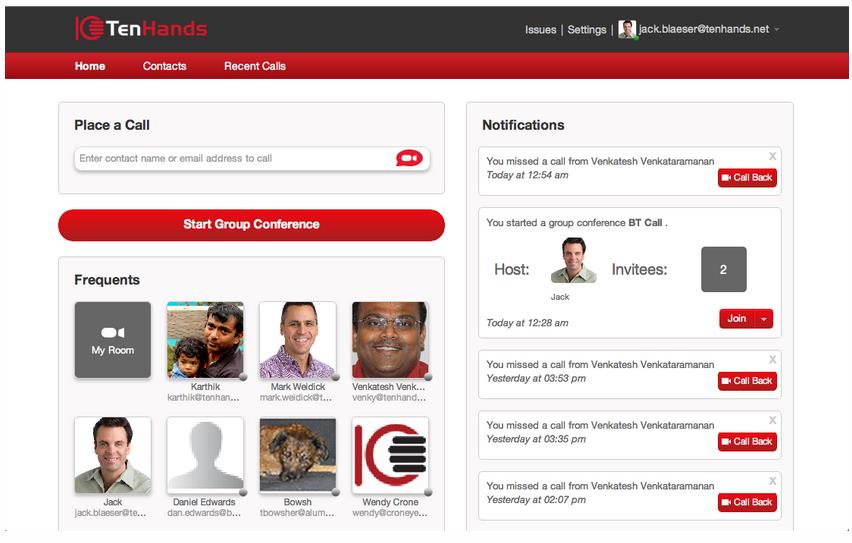As the capabilities of modern browsers expand and developing standards like Google’s WebRTC initiative for real-time communications slowly find their way into most popular browsers, we’ll likely see more video collaboration software that’s currently still client-based move to the browser as well. TenHands, which is launching its private beta today (you can request an invite here) wants to be the first out of the gate in this market and sees itself as a direct competitor to Cisco’s WebEx, Microsoft Lync and other incumbents in this space. The service offers free video conference calls, screensharing, as well as built-in support for sharing documents from your desktop and Box.net.
As for pricing, TenHands’ COO and co-founder Jack Blaeser told me earlier today, the company is planning to use a freemium model after the beta phase ends. Users will get three free hours of usage per month and will have to pay $10/month if they need more time.
The service currently uses a small plugin to enable WebRTC in Chrome, IE, Safari and Firefox on both Mac and Windows machines. The idea here, though, is to move away from plugins as soon as more browsers support this standard natively. Technically, TenHands’ architecture can handle calls with an unlimited number of participants, but the beta currently has a soft limit of ten.
 One major advantage of being web-based, TenHands’ COO and co-founder Jack Blaeser told me earlier today, is the fact that this makes it very easy for the company to add support for other web-based services. Currently, TenHands supports Box.net, for example, but the company plans to add more services (think Yammer, Google Drive, DropBox, etc.) in the near future. This approach, said Blaeser, will also allow the team to easily customize the service for large enterprises that want to whitelabel it.
One major advantage of being web-based, TenHands’ COO and co-founder Jack Blaeser told me earlier today, is the fact that this makes it very easy for the company to add support for other web-based services. Currently, TenHands supports Box.net, for example, but the company plans to add more services (think Yammer, Google Drive, DropBox, etc.) in the near future. This approach, said Blaeser, will also allow the team to easily customize the service for large enterprises that want to whitelabel it.
TenHands, according to Blaeser, is currently about a year ahead of its closest competitors in moving to WebRTC. It’s worth noting, too, that Blaeser’s co-founder and TenHands’ CEO Mark Weidick was formerly the head of Cisco’s Telepresence Exchange business.
As far as the video quality goes – and that, after all, is one of the most important aspects of these kinds of services – the company promises high-quality video – and in my tests, that’s definitely what it delivered. The easy-to-use web interface lets you start and accept calls with just a few clicks. After that, your browser window will be taken over by your contact’s video or screen. For calls with multiple participants, TenHands uses the same “active speaker” setup as Google+, for example, and automatically features whomever is currently speaking in the main window.
The Sunnyvale-based company currently has 10 employees and has received funding from Trinity Ventures. The size of this funding round was not disclosed.

